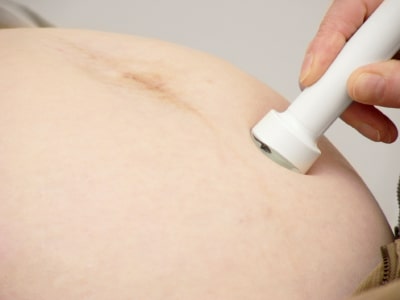Doctors are warning expectant parents that fetal heart rate monitors that can be bought personally and used at home should just be used for entertainment and not as an alternative to medical advice. They do not always provide an accurate picture of the health of the baby.
The devices may provide false reassurance in some situations, according to Abhijoy Chakladar, MD, of Princess Royal Hospital in West Sussex, England.
Dr. Chakladar highlighted a case that was recently published in British Medical Journal of one 34 –year-old expectant mother who noticed a reduction in her baby’s movement but delayed getting medical help after using a monitor.
When she was finally treated by doctors they found that the baby had passed away in-utero.
While the baby’s death may not have been avoidable, doctors from Brighton and Sussex University Hospital, who treated the woman, say that at the very least the monitor caused her to delay seeking help.
He said the stillbirth “may have been unavoidable,” but listening to the fetal heart monitor “certainly delayed presentation to the hospital.”
“Without training,” he added, sounds heard on the monitor “could easily be misinterpreted.” Likely, the mother had simply heard her own pulse or placental flow instead.
The home monitor devices give only a quick snap shot of the heart rate and nothing more. Moms are also not trained to listen to a baby’s heartbeat, therefore making this difficult.
Sales and use of at home fetal heart devices are on the rise says Rebecca Coombes, associate editor of BMJ. Many of these devices are being bought on the Internet and not all of them being offered/sold are of medical grade either.
Ms. Coombes said the regulated products use medical-grade ultrasound Doppler devices, which have to conform to medical standards and can cost $500 or more. But cheaper devices that do not use ultrasound retail for as little as $33.
“These are not considered medical devices,” she said.
Dr. Chakladar said that companies and manufacturers have an obligation to make this very clear to buyers.
I can totally relate with this article. I had my first son had 24 weeks in the summer of 2005. Just last October I found out I was expecting again. I was a nervous wreck because of all we went through the first time. Sadly, at only six weeks I miscarried. It was not long after that, at the end of December that I found myself pregnant again.
Once I passed the 6 week mark which I had miscarried at just prior, I started looking online to buy a fetal heart monitor. I received one in the mail when I hit 10 weeks and tried for hours that first night but couldn’t hear anything. Frustrated and upset, I emailed the company and they said by 12 weeks 98% of moms can find the heartbeat easily. So I waited.
At 12 weeks I tried and when I still heard nothing, I went for an ultrasound to make sure everything was fine.
Around 13 weeks I finally found the baby’s heartbeat. While I could pick mine up very easily, I can see how some moms could confuse theirs with the baby’s.
I would obsess and check every single day. There were many times I would wonder if something happened to the baby because I couldn’t get the heartbeat.
So, on the other side of “entertainment”, these can also cause unnecessary worry.
Don’t get me wrong, when I DID get the heartbeat it was absolutely awesome to listen to but I never would have “relied” on that at all. – Shannon, staff writer







